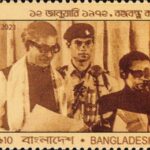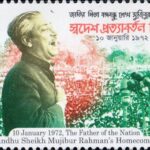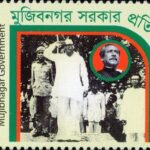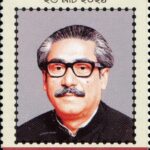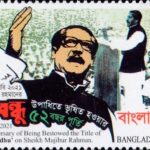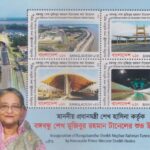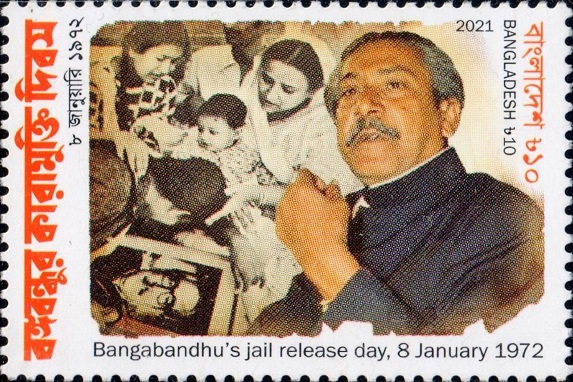
Bangabandhu’s Jail Release Day
A commemorative postage stamp on the Jail Release Day of Bangabandhu Sheikh Mujibur Rahman, 08 January, 1972 :
 Issued by Bangladesh
Issued by Bangladesh
Issued on Jan 8, 2021
Issued for : On this issue, Bangladesh Post has issued a Commemorative Postage Stamp of denomination of Tk. 10, a First Day Cover of Tk. 10, a Data Card of Tk. 5.00 and a Special Canceller.
Designer : Mr. Sanjiv Kanti Das
Type : Stamp, Mint Condition
No. of Stamp : 01 (One) Pcs
Colour : Multicolour
Denomination of Stamp : Tk. 10/- (Ten)
Size of Stamp : 32 mm x 48 mm
Perforation of Stamps : 12.5
Qnt of Stamps : 50,000 (Fifty Thousand) pcs
Process of Printing : Offset
Printer : The Security Printing Corporation (Bangladesh) Ltd., Gazipur-1703
About :
- When the Pakistan Army in the dark night of 25 March, launched “Operation Search Light” against Bengali civilians, intelligentsia, students, politicians, armed personnel and started the worst, hellish and devised genocide of the 20th century, the Undisputed Leader of the Bengali (Bangalee) Nation, the Greatest Bengali (Bangalee) of all time, Father of the Nation Bangabandhu Sheikh Mujibur Rahman proclaimed the independence of Bangladesh through the wireless of the then EPR at the first hour of March 26, 1971. Right after the proclamation of independence Bangabandhu was arrested and flown to West Pakistan and kept in a prison there.
- After the proclamation of the independence of Bangabandhu Mukti Bahini (the Freedom Fighters also called as Liberation Army and Bangladesh Forces) was formed. Indian and Bangladesh forces were put under a joint command structure led by Lt. Gen. Jagjit Singh Aurora and this force came to be known as Mitro Bahini. Mitro Bahini provided training, arms, ammunition and combat tactics to freedom fighters. They fought side by side with freedom fighters and a large number of officers and soldiers of Mitro Bahini sacrificed their lives during Bangladesh Liberation War. India joined the Bangladesh Liberation War on 3 December 1971, after Pakistan launched “Operation Chengiz Khan” (Pakistan launched pre-emptive air strikes) on North India. With air supremacy achieved in the eastern theatre and the rapid advance of the Indian and Bangladesh forces toward Dhaka, Pakistani Army compelled to take decision to surrender. On 16 December 1971 at the Ramna Race Course garden in Dhaka Lieutenant General Amir Abdullah Khan Niazi, Martial Law Administrator Zone-B and Commander, Eastern Command (Pakistan) surrendered to Lieutenant-General Jagjit Singh Aurora, General Officer Commanding in Chief, India and Bangladesh forces in the Eastern Theatre. On behalf of Bangladesh, Group Captain A. K. Khandker acted as witness to the surrender. Over 93000 Pakistani troops surrendered to India and Bangladesh forces making it the largest Surrender since Second World War. Under the indomitable, undaunted, persevering, courageous, brave and vigorous leadership on 16 December, 1971 a sovereign and independent state – Bangladesh manifested in the world map.
- During August and September of 1971 the Pakistan Junta Government held a secret trial of Bangabandhu Sheikh Mujibur Rahman and sentenced him to death. After 16 December the People’s Republic of provisional Government which moved to Kolkata (Calcutta) as a Government in exile came back to Dhaka and took the responsibility of administration of the newly independent country. On December 27, the Bangladesh Government sought Bangabandhu’s immediate and unconditional release.
- In Pakistan Yahya Khan had to quit as President under public pressure and a sort of mini-coup staged by the then Chief of Army Staff General Gul Hasan, Zulfiquar Ali Bhutto took power by overthrowing President Yahya Khan a few days after the defeat of Pakistan Army in the Bangladesh Liberation War in 1971 and the surrender of Pakistan Army to the joint command of Bangladesh and India in Dhaka. Zulfiquar Ali Bhutto became the new President of Pakistan and the Chief Martial Law Administrator and announced the release of Bangabandhu Sheikh Mujibur Rahman in the face of tremendous pressure from the World community.
- On January 08, early in the morning a PIA Boeing took Bangabandhu Sheikh Mujibur Rahman to London. Zulfiquar Ali Bhutto saw Bangabandhu off at the Rawalpindi airport amid safety. “The bird has flown” Bhutto told reporters later. When the most desired and most joyous news of the release of the Great Hero of the independence Bangabandhu Sheikh Mujibur Rahman came on the radio around 7-8 in the evening of December 08, 1972 the Whole Country burst into endless joy.
- The reputation of his courageous and vigorous leadership led Bangabandhu Sheikh Mujibur Rahman to compare him with the Great Himalayas and to treat him with the highest respect which had been exemplified in the historic comments of the Cuban Legendary Communist Revolutionary and great Leader Fidel Castro at the Non-Aligned Movement (NAM) Summit in Algiers, the Algerian capital in 1973. Embracing Bangabandhu Sheikh Mujibur Rahman Fidel Castro remarked: “I have not seen the Himalayas. But I have seen Sheikh Mujib. In personality and in courage this man is the Himalayas. I have thus had the experience of witnessing the Himalayas.” Bangabandhu left behind an eternal legacy of strong leadership. The legacy of Bangabandhu will live on forever.
- Narrator:
Shafiee Billah Jabber
Son of Martyred Intellectual Abdul Jabbar of Bangladesh Liberation War and
Author of the Trust: Martyred Intellectuals’ Memorial Trust, Bangladesh.
Editor and Publisher: The Daily Asian Express and Fortnightly City of Joy.
Subscribe
Login
0 Comments
Oldest


